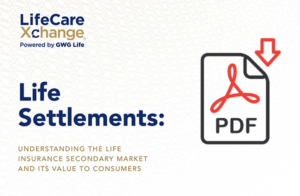Editor’s note: The following article was authored and contributed to Insurance Forums by life settlement subject matter experts at Ovid Corp.
There are many factors that one should consider when evaluating whether a life settlement make sense for a client. In general, the amount of money one can receive from a life settlement is greater than the surrender value but less than the full economic value of the policy. Policyholders on average can receive about 25% of their death benefit from a life settlement transaction. Whether or not a client should consider life settlements depends on:
• Whether they qualify
• Their financial situation and needs
• The purpose the policy serves
• The alternatives
The easiest one to evaluate is whether they qualify. If the client doesn’t qualify, it’s not worth the effort of considering the other aspects. Although there isn’t a rigid set of qualification metrics, in general, life settlement candidates:
• Are 65 years old or older
• Have a whole, universal, or convertible term policy
• Have a policy death benefit of at least $100,000
The age qualifier can be lower if the insured is of below-average health. If you determine that your client is eligible, the next step is to determine whether a life settlement is “right” for them.
Let’s first look at the financial situation and needs. Ask your client, “Can you continue to afford the policy?” Most of the time, the answer will be something along the lines of “yes, but I could really use the extra money that’s being paid toward the premium.” That is when you need to help your client evaluate the potential benefit of eliminating the premium expense. Does the premium expense account for a large percentage of their annual expense and annual income? In many cases, a policyholder purchased a policy while they were still working and had a salary. Now that they are retired, it may be more financially burdensome to keep the policy in force.
The next question you should ask is, “Are you expecting any large expenses in the near future?” For example, payment for a medical procedure. If the answer is yes, then you should look into their other funding alternatives. If you’re also your client’s financial advisor, then great, but if not, you can work with their adviser to evaluate this component. Essentially, you should evaluate their other financing options – whether it may be selling a property, taking out a loan, or getting financial support from family – relative to net settlement amount they could get by selling their policy. Keep in mind the economic cost of a life settlement (i.e. the difference between the economic value of the policy and the settlement amount).
Once you have an understanding of your client’s financial situation, the next step would be to inquire about the purpose that the policy serves. Many policies were originally purchased for ensuring that the insured’s dependents would be financially secure in the unexpected event that the insured passes away. However, many policy owners outgrow this original purchase reason. Sometimes, policy owner’s dependents no longer need that financial safety net anymore – such as when children have grown up and are self-sufficient.
Finally, the last step is to evaluate alternatives for achieving the same goal. For instance, if the policy owner has built up a large cash value, it might be a good option to take out a loan on the policy. Since you as the insurance agent are the expert here, you can evaluate these alternatives.
If you are on the fence about whether or not a life settlement is right for your client, it might be worth testing the waters to see how much money your client could get in the transaction. Often times, this value can be the deciding factor. One option for researching this is to find calculators that can estimate the amount your client could receive without having to enter in too much personal information (like our life settlement calculator).
Alternatively, you can engage in the life settlement process to get actual offers from buyers before making a final decision. This process will take longer and will require you to provide your clients’ personal information to a life settlement broker, but you’ll be getting real offers – not just estimates.
In conclusion, determining whether a life settlement is right for your client is an art. The decision will take some time, but by considering all of their needs and alternatives, you can confidently reach a good recommendation for them.
Ovid Corp. is the leading life settlement exchange, where consumers can sell their unneeded life insurance policies through an auction to institutional investors. For more information about Ovid please visit www.ovidlife.com or call 800-311-OVID.













